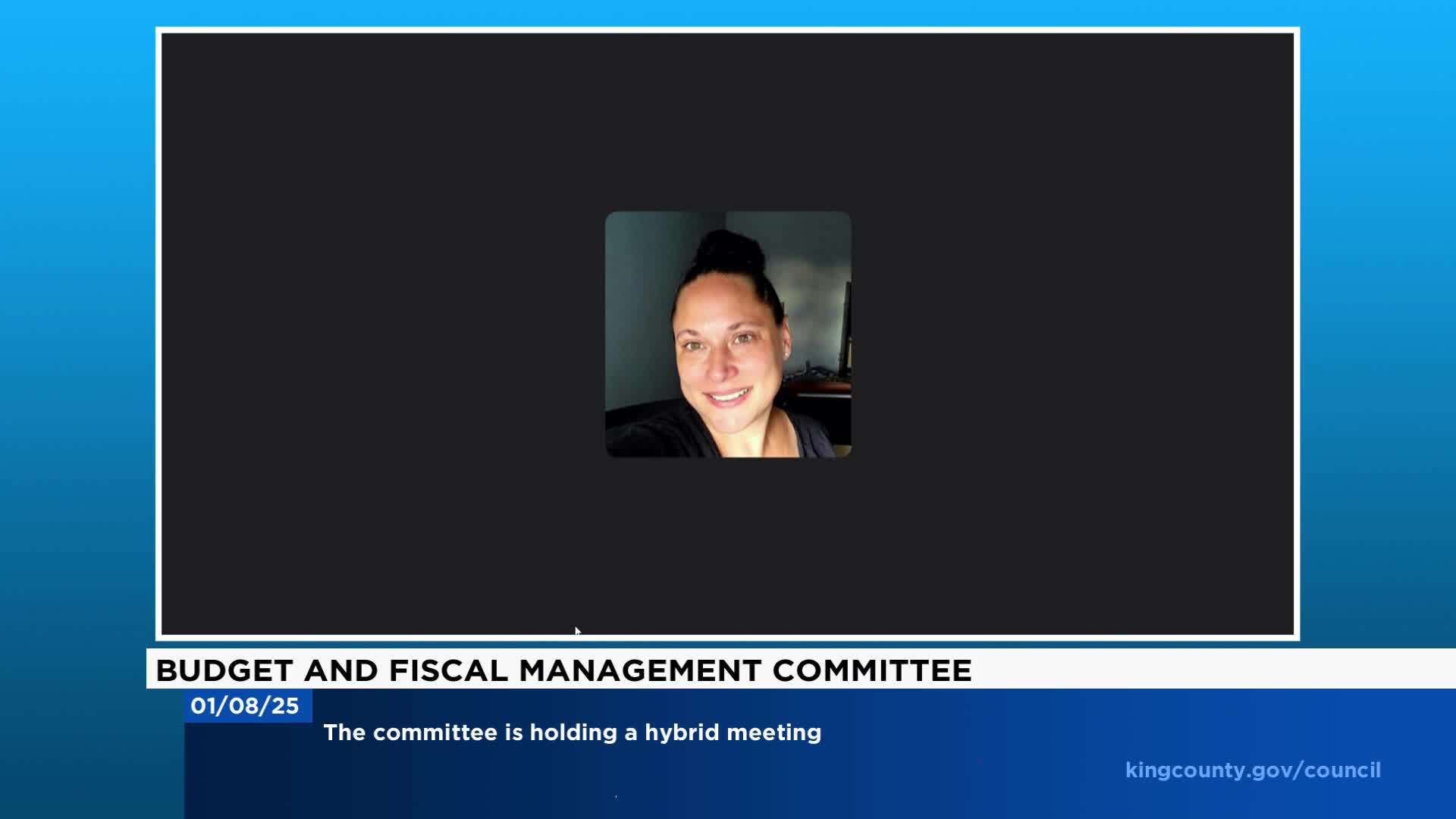Committee approves sending APHIS fingerprint levy to next council committees as amended
Get AI-powered insights, summaries, and transcripts
Subscribe
Summary
The Budget and Fiscal Management Committee voted 5-0 to advance a seven-year renewal levy to fund the regional fingerprint identification program managed by the King County Sheriff's Office, approving three technical and policy amendments and recommending further review by the Regional Policy Committee and full council.
On Jan. 8, 2025, the Budget and Fiscal Management Committee voted to advance a proposed ordinance to place a seven-year renewal levy for the King County Automated Fingerprint Identification System (APHIS) on the April 22, 2025, special election ballot, approving three amendments and issuing a due-pass recommendation to the Regional Policy Committee.
The levy would begin at 2.75 cents per $1,000 of assessed value and is estimated to increase thereafter within the statutory limit (1% per year plus new construction). Council legislative staff said the levy’s first-year tax impact on a home assessed at $875,000 would be about $24.06 in 2026. Staff estimated the levy would generate roughly $25.3 million in its first year and about $188.8 million over the seven-year period; projected program costs were about $194 million, producing a seven-year projected shortfall of approximately $5 million that officials expect to cover with the fund’s existing undesignated balance.
The APHIS program, managed by the King County Sheriff’s Office, provides fingerprint and palm-print capture and search capabilities, DNA evidence collection when requested by court order, 56 live-scan stations across the county, and two mobile ID devices for field fingerprint searches. Council legislative staff said the levy supports 117 positions across the sheriff’s office and Seattle Police Department for identification and forensic operations; duties funded include live-scan capture, print examination, latent-processing at crime scenes and in the lab, records preparation, and data transmission to state and federal databases.
"This is a conservative renewal, not a huge increase," said Council Member Girmay Zahilay, chair of the Budget and Fiscal Management Committee, summarizing staff’s presentation and the levy’s status-quo intent. KCSO staff confirmed the current 2024 levy rate was 2.9 cents per $1,000; "that’s about $24.50 for the owner of an $846,000 home," said Mike Leahy, regional APHIS manager.
Staff told the committee the current APHIS levy expired Dec. 31, 2024, and the program will operate on fund balance in 2025 unless voters reauthorize the levy. The proposed ordinance would also continue the APHIS advisory committee, which includes representatives from suburban cities, the city of Seattle and King County.
Committee members approved three amendments before the final vote: a technical correction to mark the 2018 levy as expired; a policy amendment broadening the ordinance language so election costs attributable to APHIS levy elections (not only the 2025 election) may be eligible levy expenditures; and a title amendment to correct a phrase in the ordinance. All three amendments passed by voice vote.
On the roll call for the ordinance as amended, the committee recorded five ayes, zero nos; Council Member Balducci was recorded as excused. The chair announced the ordinance would proceed to the Regional Policy Committee later the same day and that final action in full council is scheduled for Jan. 21 to meet processing deadlines.
Election staff provided cost estimates for placing the measure on different ballots: the high estimate to place the APHIS levy on the April 2025 ballot was described as approximately $4,500,000 in county charges if no other jurisdictions share costs; placing the measure on an August ballot was estimated to cost the APHIS fund between $857,000 and $994,000 (shared if other measures run), and placement on a November ballot was estimated between $651,000 and $857,000. Staff noted that as of their most recent check no other jurisdictions planned to place measures on the April ballot.
The ordinance text states levy revenue would be used for software, hardware, operations and maintenance, salaries and benefits, training, lab and office supplies, replacement of end-of-life technology anticipated in year six or seven, and election costs attributable to APHIS levy elections. Executive staff emphasized the proposal is intended to maintain current operations and not to fund new programs.
Next steps: the ordinance will be reviewed by the Regional Policy Committee and then return to full council for final consideration on Jan. 21, 2025. If the levy is not reauthorized in 2025, staff said funding for APHIS would end when fund balance is exhausted.
